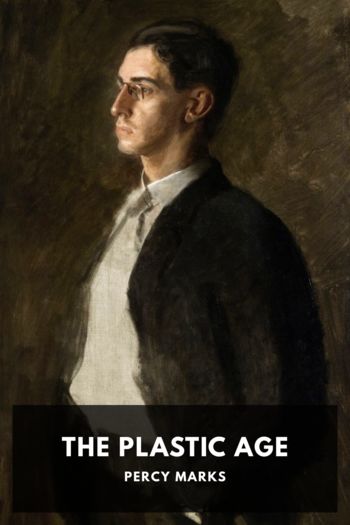The Plastic Age by Percy Marks (e book reader pc .TXT) 📕

- Author: Percy Marks
Book online «The Plastic Age by Percy Marks (e book reader pc .TXT) 📕». Author Percy Marks
Hugh was deeply impressed by the speech but disturbed by the students. From where he sat he got an excellent view of the juniors and seniors. The seniors, who sat in the front of the nave, seemed to be paying fairly good attention; but the juniors—many of them, at least—paid no attention at all. Some of them were munching apples, some doughnuts, and many of them were reading “The Sanford News,” the college’s daily paper. Some of the juniors talked during the president’s address, and once he noticed four of them doubled up as if overcome by laughter. To him the service was a beautiful and impressive occasion. He could not understand the conduct of the upper-classmen. It seemed, to put it mildly, irreverent.
Everyone, however, sang the doxology with great vigor, some of the boys lifting up a “whisky” tenor that made the chapel ring, and to which Hugh happily added his own clear tenor. The benediction was pronounced by the chaplain, the seniors marched out slowly in twos, while the other students and the faculty stood in their places; then the president, followed by the faculty, passed out of the great doors. When the back of the last faculty gown had disappeared, the underclassmen broke for the door, pushing each other aside, swearing when a toe was stepped on, yelling to each other, some of them joyously chanting the doxology. Hugh was caught in the rush and carried along with the mob, feeling ashamed and distressed; this was no way to leave a church.
Once outside, however, he had no time to think of the chapel service; he had five minutes in which to get to his first class, and the building was across the campus, a good two minutes’ walk. He patted his cap to be sure that it was firmly on the back of his head, clutched his notebook, and ran as hard as he could go, the strolling upper-classmen, whom he passed at top speed, grinning after him in tolerant amusement.
Hugh was the first one in the classroom and wondered in a moment of panic if he was in the right place. He sat down dubiously and looked at his watch. Four minutes left. He would wait two, and then if nobody came he would—he gasped; he couldn’t imagine what he would do. How could he find the right classroom? Maybe his class didn’t come at this hour at all. Suppose he and Carl had made a mistake. If they had, his whole schedule was probably wrong. “Oh, golly,” he thought, feeling pitifully weak, “won’t that be hell? What can I do?”
At that moment a countrified-looking youth entered, looking as scared as Hugh felt. His face was pale, and his voice trembled as he asked timidly, “Do you know if this is Section Three of Math One?”
Hugh was immediately strengthened. “I think so,” he replied. “Anyhow, let’s wait and find out.”
The freshman sighed in huge relief, took out a not too clean handkerchief, and mopped his face. “Criminy!” he exclaimed as he wriggled down the aisle to a seat by Hugh, “I was sure worried. I thought I was in the wrong building, though I was sure that my adviser had told me positively that Math was in Matthew Six.”
“I guess we’re all right,” Hugh comforted him as two other freshmen, also looking dubious, entered. They were followed by four more, and then by a stampeding group, all of them pop-eyed, all of them in a rush. In the next minute five freshmen dashed in and then dashed out again, utterly bewildered, obviously terrified, and not knowing where to go or what to do. “Is this Math One, Section Three?” every man demanded of the room as he entered; and everyone yelled, “Yes,” or, “I think so.”
Just as the bell rang at ten minutes after the hour, the instructor entered. It was Professor Kane.
“This is Mathematics One, Section Three,” Kane announced in a dry voice. “If there is anyone here who does not belong here, he will please leave.” Nobody moved; so he shuffled some cards in his hand and asked the men to answer to the roll-call.
“Adams, J. H.”
“Present, sir.”
Kane looked up and frowned. “Say ‘here,’ ” he said severely. “This is not a grammar-school.”
“Yes, sir,” stuttered Adams, his face first white then purple. “Here, sir.”
“ ‘Here’ will do; there is no need of the ‘sir.’ Allsop, K. E.”
“Here”—in a very faint voice.
“Speak up!”
“Here.” This time a little louder.
And so it went, hardly a man escaping without some admonishment. Hugh’s throat went dry; his tongue literally stuck to the roof of his mouth: he was sure that he wouldn’t be able to say “Here” when it came his turn, and he could feel his heart pounding in dreadful anticipation.
“Carver, H. M.”
“Here!”
There! it was out! Or had he really said it?
He looked at the professor in terror, but Kane was already calling, “Dana, R. T.” Hugh sank back in his chair; he was trembling.
Kane announced the textbook, and when Hugh caught the word “trigonometry” he actually thrilled with joy. He had had trig in high school. Whoops! Would he hit Math I in the eye? He’d knock it for a goal. … Then conscience spoke. Oughtn’t he to tell Kane that he had already had trig? He guessed quite rightly that Kane had not understood his high-school credentials, which had given him credit for “advanced mathematics.” Kane had taken it for granted that that was advanced algebra. Hugh felt that he ought to explain the mistake, but fear of the arid,





Comments (0)